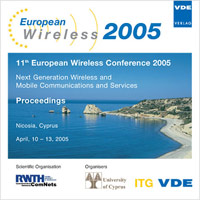Reservation-based Spectrum Load Smoothing as Cognitive Medium Access for Spectrum Sharing Wireless Networks
Conference: European Wireless 2005 - 11th European Wireless Conference 2005 - Next Generation wireless and Mobile Communications and Services
04/10/2006 - 04/13/2005 at Nicosia, Cyprus
Proceedings: European Wireless 2005
Pages: 7Language: englishTyp: PDF
Personal VDE Members are entitled to a 10% discount on this title
Authors:
Berlemann, Lars; Hiertz, Guido R.; Walke, Bernhard (Chair of Communication Networks, RWTH Aachen University, Germany)
Abstract:
This paper focuses on mitigating the coexistence problem of spectrum sharing, quality of service supporting wireless networks. The application of “waterfilling” from the information theory on the medium access of resource sharing wireless networks enables a decentralized mutual coordination and is in the following referred to as Spectrum Load Smoothing (SLS). In using SLS, the competing wireless networks aim at an equal overall smoothed utilization of the spectrum. Based on observing past usage of the spectrum or/and reservations, the wireless networks identify unused radio resources and use these opportunities for communication. In this way, the SLS is an approach to a “spectrum agile radio” that operates in spectrum originally licensed to other (incumbent, primary) radio devices: The SLS implies a search for unused spectrum, interference avoidance under coexistence in utilization of this spectrum, and a release if it is used again. SLS using radios interact and redistribute their allocations of the spectrum under consideration of their individual quality of service requirements. In this way, the SLS enables a decentralized coordination and allows an optimal usage of the frequency spectrum. In summary, the SLS realized a “cognitive medium access”. This paper introduces the application of SLS in the time domain at the example of a decentralized coordination of coexisting, quality of service supporting, IEEE 802.11e wireless networks.


